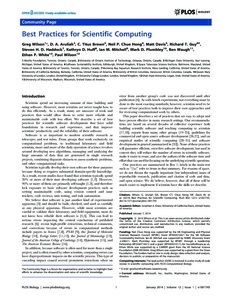Best Practices for Scientific Computing.

View/
Average rating
votes
Date
2014Author
Wilson, G.
Aruliah, D. A.
Brown, C.T.
Chue Hong, N.P.
Davis, M.
Guy, R.T.
Haddock, S.H.D.
Huff, K.D.
Mitchell, I.M.
Plumbley, M.D.
Waugh, B.
White, E.P.
Wilson, P.
Metadata
Show full item recordAbstract
Scientists spend an increasing amount of time building and using software. However, most scientists are never taught how to do this efficiently. As a result, many are unaware of tools and practices that would allow them to write more reliable and maintainable code with less effort. We describe a set of best practices for scientific software development that have solid foundations in research and experience, and that improve scientists' productivity and the reliability of their software.
Software is as important to modern scientific research as telescopes and test tubes. From groups that work exclusively on computational problems, to traditional laboratory and field scientists, more and more of the daily operation of science revolves around developing new algorithms, managing and analyzing the large amounts of data that are generated in single research projects, combining disparate datasets to assess synthetic problems, and other computational tasks.
Scientists typically develop t.....
Journal
PLoS BiologyVolume
12Issue
1Page Range
e1001745Document Language
enBest Practice Type
Best PracticeManual
DOI Original
10.1371/journal.pbio.1001745Citation
Wilson, G.; Aruliah, D.A.; Brown, C.T.; Chue Hong, N.P.; Davis, M.; Guy, R.T. et al (2014) Best Practices for Scientific Computing. PLoS Biology, 12(1): e1001745. DOI: https://doi.org/10.1371/journal.pbio.1001745Collections
The following license files are associated with this item:
 Repository of community practices in Ocean Research, Applications and Data/Information Management
Repository of community practices in Ocean Research, Applications and Data/Information Management
